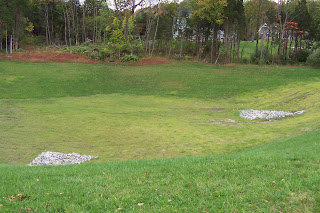The Transformational Power of Gardening™

Come with me on a typical garden tour. The sky is partly cloudy, the temperature is in the mid-80s, and we’re hauling around photographic equipment that weighs about 25 pounds. We have to hit seven gardens between the hours of 9:00am and 4:00pm and, if we’re lucky, three of them will be suitable for scouting. When we get to the second garden, one of the hostesses asks, “Have you seen the Trousseau’s garden? Everyone is just raving about it!”
That’s our cue. Whether it’s number three on the tour, or number seven, that’s where we’re heading next. When we arrive, there are more than 75 people walking through the Trousseau’s modest garden. This is going to take a while. The hostess runs off to extract the homeowner from a circle of ten excited visitors who have been peppering her with questions about this plant or that ornament.
The gracious gardener takes us on a ‘Cook’s Tour’ of the garden. I ask a few specific questions to fill in the blanks and she’s off again to mingle with her other guests. Already behind schedule, we go back to the beginning and retrace our steps, snapping shots of everything that is, or could be, of interest. As we make our way around the garden, we overhear oohs, aahs, and private remarks. Everyone loves this garden.
But I’ve thought of some more questions and seek out the gardener. We’re supposed to be taking descriptive shots and plant information, but something the gardener said piqued my personal interest and I want to know more. As we look around for her, I notice that 90 minutes have evaporated. I also notice that some of the same people who arrived when we did are still here, even though the garden is no larger than two acres. They could have seen everything there is to see in 15 minutes, but no one wants to leave. There’s something in this garden beyond what meets the eye. I call it The Transformational Power of Gardening, a kind of x-factor that emanates from both the garden and the gardener.
My book takes readers on a personal tour of some of these very special spaces, to share with them the symbiotic relationship that typical gardeners have developed with their gardens. It shows how, even as the gardener is acting on the garden, the garden is having its impact upon the gardener. In such places, garden guests can feel a palpable transfer of energy and emotion that arises from both the gardeners and the works they have created. Time just flies by. Visitors have a reluctance to break their tie with the feeling that they have stepped out of one world and into another.
I’ve met such interesting people as the September 11th survivor who turned to gardening as a way to normalize his life; a woman who makes gardening a priority, despite the demands of her five small boys; a man who flies from Savannah, Georgia to New Jersey to maintain the family garden and open it to the community every year, and many others.
What makes these gardeners tick? It’s how they approach the gardening process, how they express their core personalities and creativity through their gardens, how body/mind/spirit plays itself out in their everyday activities, and the pleasure they take in the journey rather than the destination. Whether the garden is extravagant or mundane, the creation of it has altered the life of its maker.
The Transformational Power of Gardening is the first book to reach into the minds of ordinary gardeners to explore the rich potential of the gardening experience. It fills a gap between the nuts and bolts type of books on landscaping, horticulture, and garden history, and the spiritual type of books that focus on the garden as an object of meditation.
I'm still searching for a literary agent and/or publisher who is excited enough by this concept and its potential as a crossover book for general readers, to be willing to take a chance on it.

